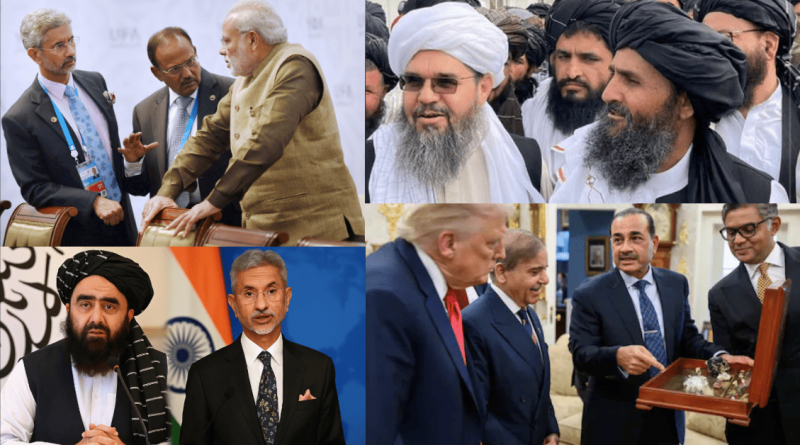OPINION: Why the Taliban Is Choosing India Over Pakistan
The decision to dispatch Muttaqi to New Delhi is therefore not just about outreach to India — it is also a stinging rebuke to Pakistan.
In a significant turn that could recalibrate South Asian geopolitics, Afghan-Taliban Foreign Minister Amir Khan Muttaqi will travel to New Delhi on October 9 — his first official visit since the Taliban regained power in 2021. The United Nations Security Council has granted him a temporary waiver from international travel sanctions, allowing the trip to proceed until October 16.
The visit marks more than a symbolic breakthrough. It reflects months of quiet backchannel diplomacy between Indian officials and Taliban leaders in neutral venues such as Dubai, and culminated earlier this year in a direct conversation between India’s External Affairs Minister S. Jaishankar and Muttaqi.
In June this year, India handed over control of the Afghan consulate in Hyderabad to a Taliban appointee, Mohammad Rahman as the consular representative.
That call came soon after the Taliban condemned the Pahalgam terror attack in Kashmir — an extraordinary moment, considering the Taliban’s long association with Pakistan’s security establishment.
India has simultaneously expanded its humanitarian footprint in Afghanistan, delivering wheat, medicines, earthquake relief tents, and medical supplies. Since the Taliban’s takeover, New Delhi has sent nearly 50,000 tonnes of wheat, over 330 tonnes of medicines, and substantial food and shelter assistance.
Following the devastating September earthquake, India was among the first responders, dispatching relief material within days. For Kabul, Delhi is emerging as a partner willing to engage pragmatically and without the overbearing demands that have characterized Pakistan’s approach.
The decision to dispatch Muttaqi to New Delhi is therefore not just about outreach to India — it is also a stinging rebuke to Pakistan. For decades, Islamabad claimed the Taliban as its creation and asset. Yet today, that influence has eroded so sharply that the Taliban are actively seeking to diversify away from Pakistan’s orbit.
From Patron to Pariah: Pakistan’s Broken Bond
Pakistan’s role in nurturing the Taliban is well documented. Seminaries like Darul Uloom Haqqaniyah produced many of the movement’s cadres, and Pakistan’s intelligence agencies offered sanctuary, arms, and financing.
For Islamabad, the Taliban were a tool to secure “strategic depth” against India. But influence is not permanent, and Pakistan has squandered it through hubris, duplicity, and coercion.
One turning point was Islamabad’s airstrikes inside Afghan territory. In December 2024, Pakistani aircraft struck Barmal district in Paktika province, reportedly killing civilians under the pretext of targeting Tehrik-e-Taliban Pakistan (TTP) hideouts.
The Taliban reacted furiously, calling the raid a “violation of sovereignty” and warning of consequences. By repeatedly bombing Afghan soil, Pakistan crossed a line from patron to aggressor, undermining whatever goodwill remained.
Another blow came with Islamabad’s decision to expel Afghan refugees. More than 80,000 Afghans were forced to return earlier this year, many with nowhere to go. Kabul viewed this as a callous betrayal. Rather than brotherhood, Pakistan treated refugees as pawns in its strategic game.
For the Taliban, already struggling to manage humanitarian needs, the expulsions were proof that Islamabad valued leverage over solidarity.
The border dispute has deepened the rupture further. The Taliban refuse to recognize the Durand Line — the colonial-era boundary imposed by the British. Pakistan’s efforts to fence and formalize the border have sparked repeated clashes, especially at Torkham, where crossings have been closed and trade disrupted.
For Afghans, resisting the Durand Line is a matter of sovereignty; for Pakistan, enforcing it is a security imperative. The clash is zero-sum, and Pakistan underestimated the symbolic power of the issue.
But perhaps Pakistan’s most corrosive mistake has been its double game. For years, Islamabad “hunted with the hounds and ran with the hare” — selling cooperation to Washington while harboring Taliban leaders, then betraying them when convenient.
The Taliban leadership has not forgotten the arrests and handovers of commanders to the U.S. during the post-9/11 years. Those betrayals bred deep suspicion of Pakistani intentions.
Meanwhile, Pakistan’s internal security crisis has spilled across the border. The TTP, inspired by the Taliban’s victory in Kabul, has intensified its insurgency inside Pakistan. Islamabad demanded that Kabul rein in the group, but the Taliban balked at turning their guns on fellow militants.
The result has been open recrimination, with Pakistan accusing the Taliban of harboring terrorists and the Taliban accusing Pakistan of exporting instability.
Underlying all of this is a question of dignity. The Taliban, now rulers of Afghanistan, refuse to be treated as clients or proxies. Pakistan’s patronizing posture — airstrikes, expulsions, fencing, and demands — has alienated a movement that now insists on equal footing.
Kabul’s outreach to India, once unthinkable, has become a declaration of independence.
Why India, and Why Now?
India’s renewed relevance in Afghanistan is not ideological but pragmatic. For Kabul, Delhi offers what Islamabad no longer can: stability, resources, and respect.
First, India has sustained its humanitarian assistance. Wheat, medicines, earthquake relief, and development projects have directly benefited millions of Afghans. This tangible aid bolsters the Taliban’s domestic credibility at a time when international recognition remains elusive.
Second, India provides historic continuity. From constructing Afghanistan’s parliament building to investing in roads, dams, and schools during the 2000s, Delhi has built goodwill across generations. Even after 2021, when most Western embassies evacuated Kabul, India cautiously maintained a presence and continued delivering aid.
Third, India offers alternatives to Pakistan’s chokehold on trade. Through the Chabahar port in Iran, Afghanistan gains a maritime outlet that bypasses Karachi. For a landlocked country, this access is transformative — and strategically liberating.
Fourth, India’s diplomatic approach is carefully calibrated. It has engaged the Taliban without formal recognition, striking a balance between protecting its interests and avoiding premature legitimization. For Kabul, this provides engagement without subordination.
Finally, embracing India signals to other powers — from Russia to the Gulf states — that the Taliban are not beholden to Islamabad. Diversification of partners enhances Kabul’s strategic autonomy.
Pakistan’s Strategic Miscalculation
At its core, Pakistan’s loss of influence over the Taliban stems from one fatal error: mistaking coercion for control. By bombing Afghan soil, expelling refugees, fencing contested borders, and treating Afghans as pawns, Islamabad alienated the very force it once nurtured. Its duplicity — supporting militants while courting Washington — has left it distrusted by all sides.
The Taliban, in turn, have chosen pragmatism. They see in India a partner who delivers aid without interference, offers trade without humiliation, and engages without betrayal.
For New Delhi, the opportunity is clear: to secure its long-term interests in Afghanistan, to deny Pakistan its long-cherished “strategic depth,” and to assert itself as a stabilizing force in the region.
As Amir Khan Muttaqi steps into his meetings in New Delhi, the symbolism will be unmistakable. The Taliban — once Pakistan’s prized proxy — are now opening their doors to India, Islamabad’s arch-rival. It is more than a diplomatic engagement. It is the visible consequence of Pakistan’s failed policies, its double game, and its arrogance.
In the great chessboard of South Asia, Afghanistan is moving away from Pakistan’s shadow and toward India’s embrace. For Islamabad, the message is painful but clear: the days of monopolizing Kabul are over.
Disclaimer: Views expressed by writers in this section are their own and do not reflect Milli Chronicle’s point-of-view.



